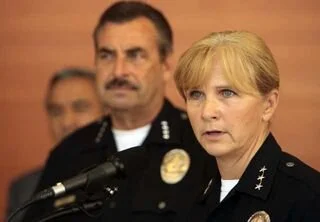The death of George Floyd in Minneapolis set off outrage, weeks of demonstrations across the country and around the world, and has started discussion and legislative action at every level of government. On this episode, we’ll ask an African American law enforcement leader what policing has been like – and where it goes now.
Read MoreCan you believe it? Our first episode was published on this date in 2016! 117 interviews and countless bonus episodes later, producer Josh Raulerson joins Dave to mark the occasion with a look back at four years of Criminal Injustice.
Read MoreEvery year, more than 600,000 Americans leave our jails and prisons. Many are on parole. Others people are put on probation instead of going to prison. The job of supervising all of them falls to parole and probation officers.
Read MoreSan Quentin Prison in California has always had a reputation as one of the toughest, most violent prisons anywhere. But twelve years ago, the prison’s in-house newspaper, produced by inmates, began to change things. What can journalism do for incarcerated people, and for the prisons in which they serve their sentences? And what about the impact on people outside of prison?
Read MoreEvery year, courts hand out sentences of life without the possibility of parole to people convicted of serious crimes. Our guest today was one of those people, and he’ll tell us what that was like – and, with his sentence commuted, what his life is like on the outside, after 43 years.
Read MoreWhen HIV appeared in the U.S., it was a death sentence and a source of real fear. Now, with treatment, people living with the virus can live long and full lives. So why do laws still criminalize some actions of people living with HIV?
Read MorePolice suicides are on the rise. Just how bad is the problem? Why is it happening, and what can be done to stop it?
Read MoreThe National Initiative for Building Community Trust and Justice began just a year after Ferguson. The Initiative aimed to improve criminal justice outcomes and police-community relations in six cities. Now the results are in. Did it work? And what can we learn as we look for ways to improve our whole system?
Read MoreIn the U.S., our prisons are full of people raised in the poorest neighborhoods, who only had access to the worst schools. So what happens when they can enter a first-class college program – inside prison?
Read MoreThe U.S. uses solitary confinement like no other country in the world, and nowhere more than the Supermax prison in Colorado. Solitary damages prisoners' minds, and the U.N. has called it torture. What happens when prisoners leave Supermax?
Keegan Hamilton is a senior reporter at Vice News.
Read MoreThe law makes heroin, cocaine, and meth illegal according to their defined chemical structures. But what about drugs made from synthetic compounds, which can be changed with a tiny tweak in a clandestine lab? Can the law just say "close enough?"
Read MoreKoch Industries and Charles and David Koch – names that are synonymous with right-wing political causes and deregulation of industry. So why is Koch joining with the left to give former inmates second chances?
Read MoreUrban violence kills thousands of Americans every year. It accounts for almost three quarters of the murders in the U.S., and it traps a huge number of people in poverty, blight, trauma and despair. What if there was a way cut murderous urban violence – by half?
Read MoreMany people make their social media posts public. Everyone can see them, like a signed billboard visible anywhere in the world. So, what should we think when we learn that *some* police officers, in some departments, have been posting racist messages or memes endorsing violence, visible to anyone on the Internet?
Read MoreIn the last five years, we’ve seen case after case of police killing unarmed civilians – even people running away. Usually, officers do not face charges; when they do, juries often acquit them. Does the law governing police use of
force favor police?
Mass incarceration remains the hallmark of the US justice system, as it has been for decades. In the last ten years, in some states, we see less jail in low-level cases and more electronic monitoring. But does this just trade one form of custody for another?
Read MoreThe American criminal justice system is all about finding the bad guys, convicting them, and penalizing them -- often by sending them to prison. But what does that do to help victims restore themselves? Can we imagine a system not of criminal justice, but restorative justice?
Read MoreAmerican prosecutors have always been powerful figures in our justice system: they decide the charges, and offer the plea bargains. But our guest says they have become far too powerful – resulting in mass incarceration and the wrecking of human lives over trivial offenses.
Read MoreJury service is THE way that members of the public participate in the criminal justice system. But who gets to serve? Are certain racial or ethnic groups excluded, and what’s the effect of these exclusions in the courtroom?
Read MoreWhen policing has a major crisis – the 1980s crime wave, or the killings of unarmed black men by police in 2014 and 2015 – we often grab for a high-tech fix. But technology seldom becomes the silver bullet we hope for. Our guest has put this trend under the microscope. We talk with veteran investigative journalist Matt Stroud about his new book, Thin Blue Lie: The Failure of High-Tech Policing, published in April of 2019.
Read More



















